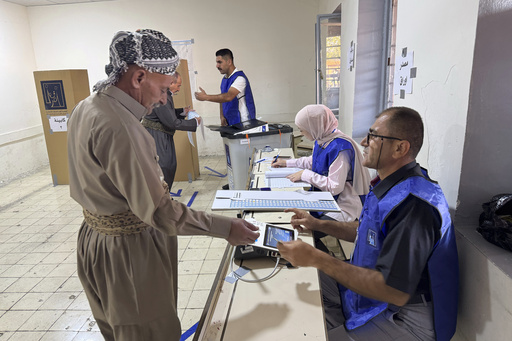
IRBIL, Iraq — The results from the recent election for the regional parliament in Iraq’s semi-autonomous Kurdish region reveal that the two leading Kurdish parties continue to dominate the political landscape, while an emerging opposition party has made notable gains, officials reported on Wednesday.
The Independent High Electoral Commission announced that the Kurdistan Democratic Party (KDP), which has strong support from the regional capital Irbil and the city of Dohuk, emerged as the clear frontrunner, securing 39 seats in the parliament.
In contrast, the Patriotic Union of Kurdistan (PUK) captured 23 seats, maintaining its influence particularly in Sulaymaniyah. In the previous elections held in 2018, the KDP and PUK had won 45 and 21 seats, respectively, illustrating a continuation of their longstanding rivalry.
One of the more significant developments was the performance of the relatively new opposition party, New Generation, which increased its representation from eight to 15 seats since its establishment in 2018. The Kurdistan Islamic Union obtained seven seats, placing fourth, and revealed plans to collaborate with New Generation in the opposition within the regional parliament, which consists of 100 seats. A few smaller parties also managed to gain representation.
Voter turnout was robust, with 72% of eligible participants casting their votes, despite encountering some technical difficulties at polling sites. The rising support for New Generation appears to reflect a growing discontent among younger voters, who are increasingly frustrated with ongoing economic difficulties in the region, including delays in salary disbursement, high unemployment rates, and perceived corruption among established political figures.
Economic issues remain a central concern, as frustrations regarding late payments to civil servants, unstable oil prices, and ongoing disputes over the budget with the central government in Baghdad catalyze demands for reforms and accountability.
Among the seats available for ethnic and religious minorities, three Assyrian Christian candidates and two Turkmen candidates claimed the reserved seats, despite a controversial ruling earlier this year by the Iraqi federal court that eliminated reserved seats for minorities. This arrangement typically benefits candidates affiliated with major political parties, calling into question the authenticity of minority representation.
Toma Khoshaba, an Assyrian ethnic activist, expressed concerns regarding the lack of genuine representation. He stated, “Our voices are being silenced, and we no longer have true representation in parliament or the government.” Khoshaba criticized what he described as “independent Assyrian representatives occupying the quota seats,” suggesting they are mainly backed by the KDP or Shiite factions, emphasizing their allegiance lies with these dominant political entities rather than with their own communities.
The results of this election will significantly influence how Kurdish leaders navigate ongoing tensions with Baghdad, particularly regarding issues such as oil revenue sharing and budget allocations, as well as addressing wider economic hurdles facing the region.
